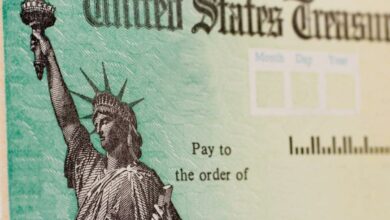10 debt relief options for student loans


With the average cost of college tuition surpassing $11,000 per year at public universities, it’s no surprise that the majority of college graduates leave school owing money. In fact, students and parents borrowed approximately $98 billion in student loans to pay for college in 2023.
If your student loan balance feels overwhelming, you may be looking for debt relief options. Student loans have more limitations than other forms of debt, but there are ways to make your payments more manageable or even get help to repay your loans.
Why are student loans so different from other forms of debt?
Student loans are a unique form of debt.
“Student loans can feel like a double whammy for recent graduates,” said Todd Christensen, an education manager with MoneyFit, a non-profit credit counseling agency. “First, they’re often saddled with high monthly payments that can be tough to swing on a starting salary. Second, they can feel overwhelmed when trying to navigate the different repayment options available through their lender.”
If you take out loans and struggle to pay them back, defaulting on your loans can have significant consequences. In the case of federal loans, your loan servicer can
garnish your wages or Social Security benefits and even seize your tax refund without a court order.
And while borrowers may consider bankruptcy, it may not be the solution you’d expect.
“Student loan debt in the U.S. is notoriously difficult to discharge in bankruptcy,” said Cliff Andrews, CEO of the Consumer Debt Relief Initiative, a debt resolution industry association. “Borrowers must demonstrate ‘undue hardship’ to have these loans discharged, a much higher bar than for most other types of debt, making student loans a more persistent financial burden for those who struggle to repay them.”
Although it’s not impossible to get your loans discharged in bankruptcy, it’s rare, so escaping your debt is challenging.
10 Debt relief options for student loan borrowers
Depending on the type of loans you have, you could take advantage of one or more of the following debt relief options for your student loans:
1. Contact your loan servicer to discuss payment options
As soon as you realize your student loan payments are too high for you to afford, contact your loan servicer — the company handling your loans. If you reach out before missing a payment, you’ll likely have more options.
If you have federal student loans, you may be eligible for an income-driven repayment (IDR) plan. There are currently four IDR plans, but all of them base your payments on a percentage of your discretionary income. Some borrowers even qualify for $0 payments, so they can pay nothing toward their loans without becoming delinquent on their debt. It’s free to enroll in an IDR plan, and you can use the Federal Student Loan Payment Simulator tool to find out what your payments would be under each of the payment plans.
Private student loans aren’t eligible for IDR plans, but some private lenders have their own alternative payment plans. Depending on the lender, you may be able to make reduced payments for a limited period, giving you time to improve your finances.
2. Pursue loan forgiveness
Loan forgiveness is possible, but it’s limited to federal student loan borrowers. There are three main federal loan forgiveness programs:
- IDR Forgiveness: If you enroll in an IDR plan, keep up with your payments and still have a balance at the end of the plan’s repayment term, the government will forgive your remaining balance. Depending on your balance and the IDR plan, you could qualify for forgiveness in 10 to 25 years.
- Public Service Loan Forgiveness (PSLF): PSLF is a program for federal loan borrowers who work for non-profit organizations or government offices. You can qualify for forgiveness of 100% of your remaining loan balance if you work for an eligible employer for 10 years and make 120 qualifying monthly payments. Under PSLF rules, payments made under an IDR plan count, so you can qualify for loan forgiveness even if you make reduced payments through an IDR plan.
- Teacher Loan Forgiveness: Teacher Loan Forgiveness provides up to $17,500 in loan forgiveness to elementary or secondary school teachers with federal student loans who teach in low-income schools for at least five full and consecutive years.
3. Explore loan cancellation options
While loan forgiveness is earned through your employment or payment status, loan cancellation is available due to circumstances outside your control. Common loan cancellation options include:
- Total and permanent disability: If you become totally and permanently disabled and are unable to work, you may qualify for a discharge of your loans. Total and permanent disability discharge is a federal program, but some private lenders offer loan discharge for borrowers with disabilities too.
- Borrower defense to repayment: If you attended a school who was found to be violating federal or state laws or selected a college based on misleading information, you may be eligible for loan discharge through borrower defense to repayment. Only available to federal loan borrowers, you can view the list of colleges involved in borrower defense to repayment discharges on the Federal Student Aid website.
4. Apply for forbearance or deferment
If you have a temporary financial hardship, such as a job loss or medical illness, you may be eligible for forbearance or deferment. These programs allow you to temporarily pause your payments.
Federal forbearance programs tend to be longer in duration, and there are more qualifying circumstances. However, some private lenders also operate their own forbearance programs and allow you to postpone your payments.
5. Sign up for debt counseling
If you have student loans and need help understanding your repayment options, some
non-profit credit counseling agencies have programs specifically designed for student loan borrowers.
Bruce McClary, senior vice president of membership and media relations with the National Foundation for Credit Counseling (NFCC), said debt counselors can help borrowers in several ways.
“NFCC Certified Student Loan Counselors can assess your financial situation, including your income, expenses, and all of your debt (including student loans),” he said. “They’ll help you create a realistic budget and develop a personalized repayment strategy that considers all your loans, including federal options like income-driven repayment plans and potential consolidation strategies.”
Non-profit credit counseling services are often free or based on a sliding scale. And if you’re also managing other forms of debt, a credit counselor can help with credit card balances, medical bills and more.
“It’s important to note that many struggling student loan borrowers are also facing challenges repaying other debt, such as credit card balances,” McClary said. “A Debt Management Plan can work in tandem with student loan counseling to provide a more comprehensive solution.”
Some of the best debt relief companies may also offer support for private student loan debt.
6. Get loan repayment assistance from your state
Depending on your location and profession, you may qualify for help with your loans from the state. Some states have special loan repayment assistance programs to encourage workers in high-need areas, such as healthcare or education. For example:
7. Ask your employer for help
Some employers will help their employees with their loans by contributing to their student loan repayment. According to the Society for Human Resource Management, 8% of employers offer student loan reimbursement benefits.
If you qualify for student loan repayment benefits, the employer will match up to a monthly maximum toward your student loans. For example, if your employer matches up to $100 per month, you could get $1,200 per year toward your loans.
8. Settle your student loan debt
If you have student loans and other forms of debt, debt settlement can be appealing. However, debt settlement with student loans is difficult.
With federal loans, successful debt settlement is exceedingly rare, and you’ll need to pay about 85% to 95% of your balance plus interest and fees to settle. You’ll have to handle negotiations on your own; the U.S. Department of Education doesn’t participate in debt settlement programs.
As a result, debt settlement companies won’t work with federal loans, but some companies may be willing to help you negotiate a settlement for private student loans.
“Whether a debt settlement company will assist in settling a private student loan will depend on the company’s experience with the creditor,” said Andrews.
Depending on your situation, typical settlements range from 40% to 70% (before accounting for the debt relief company’s fees).
“While debt settlement is not right for everyone, we have witnessed the power of financial reset that debt settlement companies provide,” Andrews said.
9. Refinance your student loans
For borrowers with high-interest loans, student loan refinancing is one way to save money or accelerate repayment. By refinancing, you take out a new loan and use it to pay off your existing federal or private loans. If you have good credit — or a family member with good credit who is willing to co-sign your application — you could qualify for a loan with a lower interest rate than you have now, lowering your monthly payment and total repayment cost.
However, there are downsides to refinancing, particularly if you have federal loans. Once you refinance federal debt, you lose access to federal loan benefits like IDR plans and loan forgiveness, so it’s usually best to only refinance your private loans.
10. Consult with a bankruptcy attorney
If your debt is so overwhelming that you see no way out, bankruptcy could be a solution. Discharging student loans in bankruptcy is rare, but it is possible to have federal and private loans discharged.
Bankruptcy is a serious step with long-lasting consequences to your credit, so it should only be explored once you’ve exhausted other debt relief options. To find out whether bankruptcy makes sense, contact a non-profit credit counselor or a bankruptcy attorney.
Student loan debt relief FAQs
Can student loan debt be settled?
Whether your student loans can be settled depends on the loans you have. Debt settlement companies typically exclude federal student loans, but some companies will work with private student loans.
What debt relief options are available for student loans?
Depending on your situation, you may be eligible for alternative payment plans, loan repayment assistance or even loan forgiveness based on your employment.
What happens if I can’t afford my student loan payments?
If you fall behind on your payments, the consequences can be severe. With federal loans, loan servicers can garnish your wages without a court order, and they can even take your tax refund.
Source link




